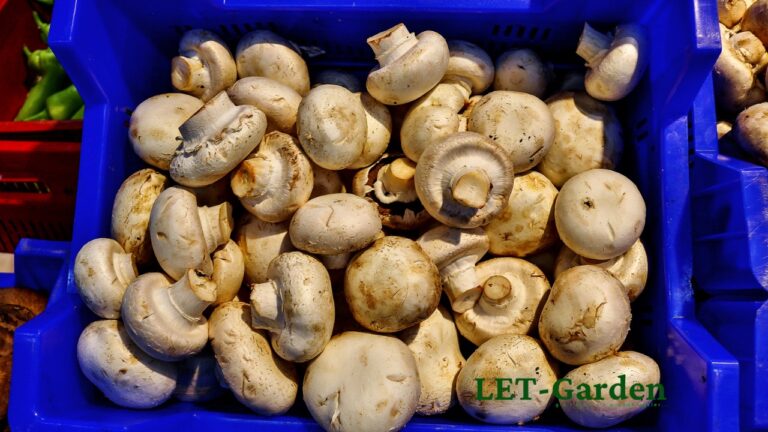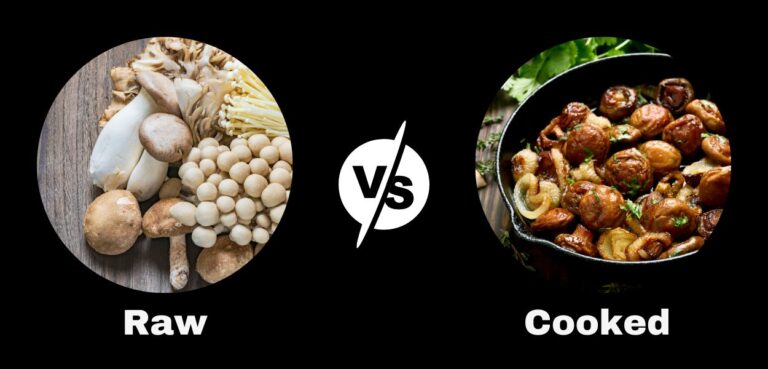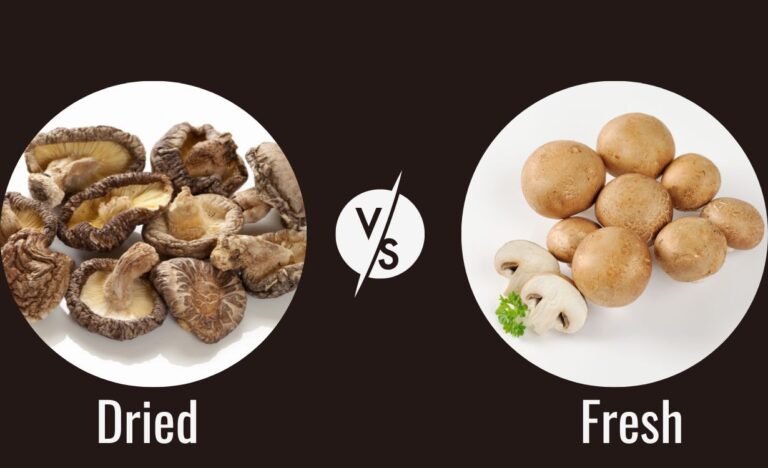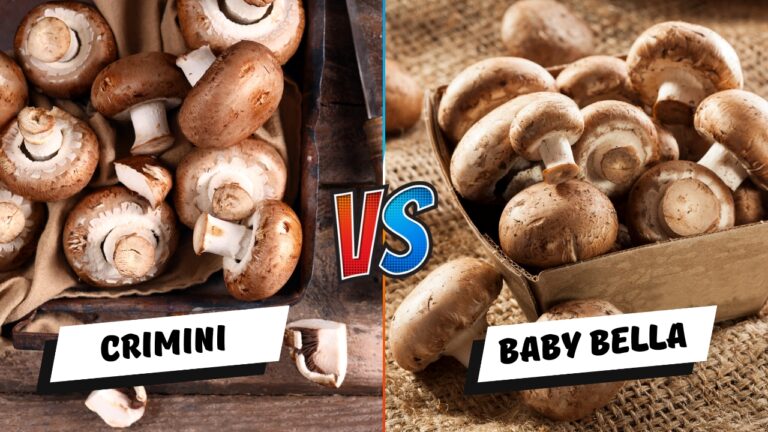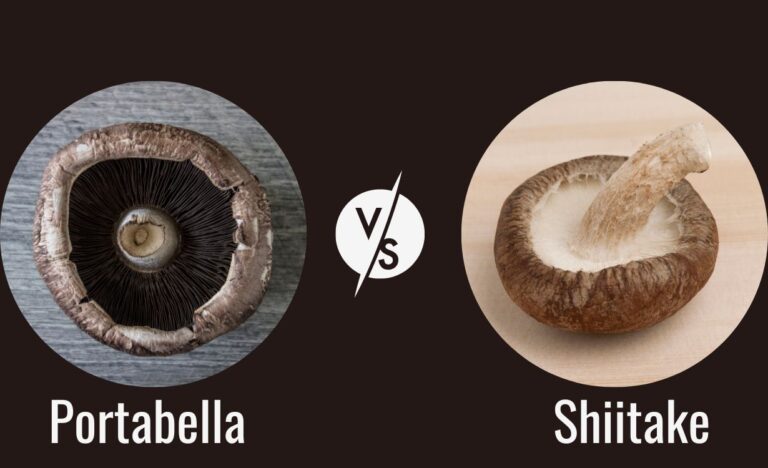
Shiitake vs White Mushrooms Nutrition
Mushrooms are a versatile and flavorful ingredient found in many cuisines worldwide. Among the most popular varieties are shiitake and white mushrooms, both of which have distinct taste and texture profiles.
However, beyond their culinary uses, shiitake and white mushrooms are also known for their potential health benefits. Understanding the nutritional differences between these two mushrooms can help individuals make informed choices when it comes to their diet and overall health.
In this blog post, we will take a closer look at the nutritional profiles of shiitake and white mushrooms and compare their respective benefits. Whether you are a seasoned mushroom lover or simply curious about incorporating more mushrooms into your diet, this post will provide you with valuable insights into the nutrition and health benefits of these two popular mushrooms.
Nutritional Profile of Shiitake Mushrooms

Shiitake mushrooms are a popular ingredient in many Asian dishes, but they are also gaining recognition in Western cuisine due to their unique flavor and potential health benefits. In this section, we will take a closer look at the nutritional profile of shiitake mushrooms, including their macronutrients, micronutrients, and health benefits.
Macronutrients
Shiitake mushrooms are a nutritious and low-calorie food option, making them an ideal choice for those looking to manage their weight. With just 39 calories per 100-gram serving, shiitake mushrooms also contain 2 grams of protein, 3.3 grams of carbohydrates, and only 0.5 grams of fat. Additionally, shiitake mushrooms are a great source of dietary fiber, with 2.5 grams of fiber per 100-gram serving.
Protein
Shiitake mushrooms are a rich source of protein, containing approximately 2 grams of protein per 100 grams of mushrooms. Protein is essential for building and repairing tissues in the body, making shiitake mushrooms a great addition to a vegetarian or vegan diet.
Carbohydrates
Shiitake mushrooms are low in carbohydrates, with only 3.3 grams of carbs per 100 grams of mushrooms. This makes them a good choice for those who are watching their carbohydrate intake.
Fat
Shiitake mushrooms are very low in fat, with only 0.5 grams of fat per 100 grams of mushrooms. This makes them a great option for those who are looking for a low-fat food.
Micronutrients
Vitamins: Shiitake mushrooms are an excellent source of vitamins B2 and B3, which are important for maintaining healthy skin, hair, and eyes, as well as producing energy in the body. They also contain small amounts of vitamin D, which is important for bone health.
Minerals: Shiitake mushrooms are a good source of minerals such as copper, which is important for producing red blood cells, and selenium, which is important for immune function and thyroid health.
Health Benefits
Immune system support: Shiitake mushrooms contain beta-glucans, which are complex sugars that have been shown to enhance the immune system by stimulating the production of white blood cells. This can help to protect the body against infections and diseases.
Anti-inflammatory properties: Shiitake mushrooms contain compounds called polysaccharides, which have been shown to have anti-inflammatory properties. Inflammation is a natural response in the body, but when it becomes chronic, it can contribute to the development of diseases such as arthritis, heart disease, and cancer. Consuming shiitake mushrooms may help to reduce inflammation in the body and lower the risk of these diseases.
However, shiitake mushrooms are a nutritious and flavorful food that can provide a range of health benefits. They are a great source of protein, low in carbohydrates and fat, and contain a variety of micronutrients that are essential for optimal health. The immune system support and anti-inflammatory properties of shiitake mushrooms make them a particularly valuable addition to a healthy diet.
Nutritional Profile of White Mushrooms

White mushrooms, also known as button mushrooms, are the most commonly consumed mushroom variety in the United States. Despite their humble appearance, white mushrooms pack a powerful nutritional punch. Here’s a closer look at the nutritional profile of white mushrooms and their potential health benefits.
Macronutrients
White mushrooms are a low-calorie food, making them an excellent choice for those looking to manage their weight. A 100-gram serving of white mushrooms contains just 22 calories, 3.1 grams of protein, 3.3 grams of carbohydrates, and 0.3 grams of fat. They are also a good source of dietary fiber, with 1 gram of fiber per 100-gram serving.
Protein
White mushrooms are a good source of plant-based protein, containing all the essential amino acids necessary for the human body. They are an excellent option for vegetarians and vegans looking to incorporate more protein into their diet.
Carbohydrates
White mushrooms are a low-carbohydrate food, with just 3.3 grams of carbohydrates per 100-gram serving. They are also considered a low-glycemic-index food, which means they don’t cause a significant spike in blood sugar levels.
Fat
White mushrooms are a low-fat food, with just 0.3 grams of fat per 100-gram serving. They are also cholesterol-free and low in saturated fat, making them a heart-healthy option.
Micronutrients
Vitamins: White mushrooms are an excellent source of vitamins B2 (riboflavin) and B3 (niacin), which play important roles in energy metabolism. They are also a good source of vitamin B5 (pantothenic acid), which is essential for synthesizing cholesterol, hormones, and neurotransmitters.
Minerals: White mushrooms are a good source of minerals such as potassium, copper, and selenium. Potassium is essential for maintaining healthy blood pressure, while copper plays a role in energy production and iron metabolism. Selenium is a potent antioxidant that helps protect the body against cellular damage.
Health Benefits
Cancer prevention: White mushrooms contain beta-glucans, a type of fiber that has been shown to have anticancer properties. Additionally, white mushrooms contain the antioxidant ergothioneine, which has been shown to have protective effects against cellular damage.
Weight management: White mushrooms are a low-calorie and low-carbohydrate food, making them an excellent choice for those looking to manage their weight. They also contain dietary fiber, which helps promote feelings of fullness and satiety.
Overall, white mushrooms are a nutrient-dense food that can be a valuable addition to a healthy diet. Whether you’re looking to manage your weight, prevent chronic disease, or simply incorporate more whole foods into your meals, white mushrooms are a versatile and delicious option to consider.
Comparison of Shiitake and White Mushrooms
When it comes to comparing the nutritional value of shiitake and white mushrooms, there are several key factors to consider. These include macronutrient content, micronutrient content, and overall health benefits. In this section, we will compare the two mushrooms in each of these categories to provide a comprehensive understanding of their differences.
Macronutrient Comparison
Shiitake and white mushrooms are both low in calories and high in fiber, making them a great addition to any diet. However, there are some differences in their macronutrient content.
- Protein: Shiitake mushrooms contain slightly more protein than white mushrooms, with 2.2 grams of protein per 100 grams compared to white mushrooms’ 1.3 grams.
- Carbohydrates: Both shiitake and white mushrooms are low in carbohydrates, with only 3.3 grams and 3.3 grams of carbohydrates per 100 grams, respectively.
- Fat: White mushrooms contain slightly more fat than shiitake mushrooms, with 0.3 grams of fat per 100 grams compared to shiitake’s 0.1 grams.
Micronutrient Comparison
Shiitake and white mushrooms both contain a variety of important micronutrients that contribute to overall health and wellbeing.
- Vitamins: Shiitake mushrooms are a particularly good source of B vitamins, including riboflavin, niacin, and pantothenic acid. They are also a good source of vitamin D, which is not found in significant amounts in white mushrooms. In contrast, white mushrooms are a better source of vitamin B2 (riboflavin), with 0.4 milligrams per 100 grams compared to shiitake’s 0.2 milligrams.
- Minerals: Both shiitake and white mushrooms are good sources of minerals, including potassium, phosphorus, and copper. However, shiitake mushrooms are a particularly good source of iron, with 2.5 milligrams per 100 grams compared to white mushrooms’ 0.5 milligrams.
Health Benefit Comparison
Shiitake and white mushrooms both offer a range of potential health benefits, thanks to their nutrient-rich profiles.
Shiitake mushrooms are known for their immune-boosting properties, thanks in part to the presence of beta-glucans, compounds that can help regulate the immune system. Shiitake mushrooms also contain compounds that have been shown to have anti-inflammatory properties, potentially helping to reduce inflammation throughout the body.
White mushrooms, meanwhile, are a great choice for those looking to support their weight management efforts. Research has suggested that white mushrooms may help to increase feelings of fullness and reduce overall calorie intake. Additionally, white mushrooms contain a type of antioxidant called ergothioneine, which has been linked to a reduced risk of certain types of cancer.
Overall, both shiitake and white mushrooms are highly nutritious and offer a range of potential health benefits. Whether you prefer the earthy flavor of shiitake mushrooms or the milder taste of white mushrooms, incorporating these fungi into your diet can be a great way to boost your overall health and wellbeing.
FAQs on Shiitake vs White Mushrooms Nutrition
Are shiitake mushrooms healthier than white mushrooms?
Shiitake mushrooms have a slightly more impressive nutritional profile compared to white mushrooms. One of the major benefits of shiitake mushrooms is that they contain vitamin D2, vitamin D3, and vitamin D4, which are crucial for our immune system, bone health, and cellular growth.
What’s the difference between shiitake and white mushrooms?
Shiitake mushrooms have brown caps that cover white gills, while white mushrooms have white caps that hide brown gills. Additionally, shiitake mushrooms have a meatier and earthier flavor compared to white mushrooms.
Does cooking shiitake mushrooms destroy nutrients?
Cooking shiitake mushrooms can lead to a loss of nutrients, particularly its water-soluble vitamin content. However, by volume, cooked mushrooms are nutritionally comparable to raw mushrooms. It’s recommended to cook them lightly or use them raw to preserve their nutrients.
Can I use white mushrooms instead of shiitake?
While you can substitute white mushrooms for shiitake mushrooms, keep in mind that white mushrooms have a milder flavor and texture compared to shiitake mushrooms. If you’re looking to achieve a more earthy and savory flavor, using shiitake mushrooms is recommended.
How often should I eat shiitake mushrooms?
It’s generally safe to consume shiitake mushrooms in moderate amounts of three to eight mushrooms per day. However, consuming high amounts of shiitake mushrooms may increase the risk of potential side effects.

Hi, I’m Miles, the lead team member behind Gardeem.com. Besides being a passionate grower and writer, I’m a husband, father and grandfather to three! I started Gardeem in 2017 to provide simple and reliable gardening advice to everyone, regardless of their ability levels.

